- Home
- J. K. Rowling
The Ickabog Page 12
The Ickabog Read online
Page 12
Some heartbroken, homeless families were giving up their children to orphanages.
By Manvik, Age 10
Ma Grunter’s orphanage had changed a great deal since Daisy Dovetail had been taken there in a sack. The broken-down hovel was now an enormous stone building, with bars on the windows, locks on every door, and space for a hundred children.
Daisy was still there, grown much taller and thinner, but still wearing the coveralls in which she’d been kidnapped. She’d sewn lengths on to the arms and legs so they still fit, and patched them carefully when they tore. They were the last thing she had of her home and her father, and so she kept wearing them, instead of making herself dresses out of the sacks the cabbages came in, as Martha and the other big girls did.
Daisy had held on to the idea that her father was still alive for several long years after her kidnap. She was a clever girl, and had always known her father didn’t believe in the Ickabog, so she forced herself to believe that he was in a cell somewhere, looking up through the barred window at the same moon she watched every night, before she fell asleep.
Then one night, in her sixth year at Ma Grunter’s, after tucking the Hopkins twins in for the night, and promising them they’d see their mommy and daddy again soon, Daisy lay down beside Martha and looked up at the pale gold disc in the sky as usual, and realized she no longer believed her father was alive. That hope had left her heart like a bird fleeing a ransacked nest, and though tears leaked out of her eyes, she told herself that her father was in a better place now, up there in the glorious heavens with her mother. She tried to find comfort in the idea that, being no longer earthbound, her parents could live anywhere, including in her own heart, and that she must keep their memories alive inside her, like a flame. Still, it was hard to have parents who lived inside you, when all you really wanted was for them to come back, and hug you.
Unlike many of the orphanage children, Daisy retained a clear memory of her parents. The memory of their love sustained her, and every day she helped look after the little ones in the orphanage, and made sure they had the hugs and kindness she was missing herself.
Yet it wasn’t only the thought of her mother and father that enabled Daisy to carry on. She had a strange feeling that she was meant to do something important — something that would change not only her own life, but the fortunes of Cornucopia. She’d never told anyone about this strange feeling, not even her best friend, Martha. After all, who’d believe that a penniless girl locked up in an orphanage could save the country? Yet the strange belief burned stubbornly inside her, like a flame that refused to go out.
Daisy lay down beside Martha and looked up at the pale gold disc in the sky.
By Eden, Age 9
Ma Grunter was one of the few Cornucopians who’d grown richer and richer in the last few years. She’d crammed her hovel with children and babies until the place was at bursting point, then demanded gold from the two lords who now ruled the kingdom, to enlarge her tumbledown house. These days the orphanage was a thriving business, which meant that Ma Grunter was able to dine on delicacies that only the richest could afford. Most of her gold paid for bottles of finest Jeroboam wine, and I’m sorry to say that when drunk, Ma Grunter was very cruel indeed. The children inside the orphanage sported many cuts and bruises, because of Ma Grunter’s drunken temper.
Some of her charges didn’t last long on a diet of cabbage soup and cruelty. While endless hungry children poured in at the front door, a little cemetery at the back of the building became fuller and fuller. Ma Grunter didn’t care. All the Johns and Janes of the orphanage were alike to her, their faces sad and pinched, their only worth the gold she got for taking them in.
But in the seventh year of Lord Spittleworth’s rule over Cornucopia, when he received yet another request for gold from Ma Grunter’s orphanage, the Chief Advisor decided to go and inspect the place, before he gave the old woman more funds. Ma Grunter dressed up in her best black silk dress to greet his lordship, and was careful not to let him smell wine on her breath.
“Poor little mites, ain’t they, Your Lordship?” she asked him, as he looked around at all the thin, scared children, with his scented handkerchief held to his nostrils. Ma Grunter stooped down to pick up one tiny Marshlander, whose belly was swollen from hunger. “You see ’ow much they needs Your Lordship’s ’elp.”
“Yes, yes, clearly,” said Spittleworth, his handkerchief clamped to his face. He didn’t like children, especially children as dirty as these, but he knew many Cornucopians were stupidly fond of brats, so it was a bad idea to let too many of them die. “Very well, further funds are approved, Ma Grunter.”
As he turned to leave, the lord noticed a pale girl standing beside the door, holding a baby in each arm. She wore patched coveralls which had been let out and lengthened. There was something about the girl that set her apart from the other children. Spittleworth even had the strange notion that he’d seen somebody like her before. Unlike the other brats, she didn’t seem at all impressed by his sweeping Chief Advisor’s robes, nor by the jangling medals he’d awarded himself for being Regimental Colonel of the Ickabog Defense Brigade.
“What’s your name, girl?” Spittleworth asked, halting beside Daisy, and lowering his scented handkerchief.
“Jane, my lord. We’re all called Jane here, you know,” said Daisy, examining Spittleworth with cool, serious eyes. She remembered him from the palace courtyard where she’d once played, how he and Flapoon would scare the children into silence as they walked past, scowling.
“Why don’t you curtsy? I am the king’s Chief Advisor.”
“A Chief Advisor isn’t a king,” said the girl.
“What’s that she’s saying?” croaked Ma Grunter, hobbling over to see that Daisy wasn’t making trouble. Of all the children in her orphanage, Daisy Dovetail was the one Ma Grunter liked least. The girl’s spirit had never quite been broken, although Ma Grunter had tried her hardest to do it. “What are you saying, Ugly Jane?” she asked. Daisy wasn’t ugly in the slightest, but this name was one of the ways Ma Grunter tried to break her spirit.
“She’s explaining why she doesn’t curtsy to me,” said Spittleworth, still staring into Daisy’s dark eyes, and wondering where he’d seen them before.
In fact, he’d seen them in the face of the carpenter he visited regularly in the dungeons, but as Mr. Dovetail was now quite insane, with long white hair and beard, and this girl looked intelligent and calm, Spittleworth didn’t make the connection between them.
“Ugly Jane’s always been impertinent,” said Ma Grunter, inwardly vowing to punish Daisy as soon as Lord Spittleworth had gone. “One of these days I’ll turn her out, my lord, and she can see how she likes begging on the streets, instead of sheltering under my roof and eating my food.”
“How I’d miss cabbage soup,” said Daisy, in a cold, hard voice. “Did you know that’s what we eat here, my lord? Cabbage soup, three times a day?”
“Very nourishing, I’m sure,” said Lord Spittleworth.
“Though, sometimes, as a special treat,” said Daisy, “we get Orphanage Cakes. Do you know what those are, my lord?”
“No,” said Spittleworth, against his will. There was something about this girl … What was it?
“They’re made of spoiled ingredients,” said Daisy, her dark eyes boring into his. “Bad eggs, moldy flour, scraps of things that have been in the cupboard too long … People haven’t got any other food to spare for us, so they mix up the things they don’t want and leave them on the front steps. Sometimes the Orphanage Cakes make the children sick, but they eat them anyway, because they’re so hungry.”
Spittleworth wasn’t really listening to Daisy’s words, but to her accent. Though she’d now spent so long in Jeroboam, her voice still carried traces of Chouxville.
“Where do you come from, girl?” he asked.
The other children had fallen silent now, all of them watching the lord talking to Daisy. Though Ma Grunter hated her, Daisy was a gre
at favorite among the younger children, because she protected them from Ma Grunter and Basher John, and never stole their dry crusts, unlike some of the other big children. She’d also been known to sneak them bread and cheese from Ma Grunter’s private stores, although that was a risky business, and sometimes led to Daisy being beaten by Basher John.
“I come from Cornucopia, my lord,” said Daisy. “You might have heard of it. It’s a country that used to exist, where nobody was ever poor or hungry.”
“That’s enough,” snarled Lord Spittleworth, and turning to Ma Grunter he said, “I agree with you, madam. This child seems ungrateful for your kindness. Perhaps she ought to be left to fend for herself, out in the world.”
With that, Lord Spittleworth swept out of the orphanage, slamming the door behind him. As soon as he had gone, Ma Grunter swung her cane at Daisy, but long practice enabled Daisy to duck out of harm’s way. The old woman shuffled away, swishing her cane before her, making all the little ones scatter, then slammed the door of her comfortable parlor behind her. The children heard the popping of a cork.
Later, after they’d climbed into their neighboring beds that night, Martha suddenly said to Daisy:
“You know, Daisy, it isn’t true, what you said to the Chief Advisor.”
“Which bit, Martha?” whispered Daisy.
“It isn’t true that everyone was well fed and happy in the old days. My family never had enough in the Marshlands.”
“I’m sorry,” said Daisy quietly. “I forgot.”
“Of course,” sighed the sleepy Martha, “the Ickabog kept stealing our sheep.”
Daisy wriggled deeper under her thin blanket, trying to keep warm. In all their time together, she’d never managed to convince Martha that the Ickabog wasn’t real. Tonight, though, Daisy wished that she too believed in a monster in the marsh, rather than in the human wickedness she’d seen staring out of Lord Spittleworth’s eyes.
We now return to Chouxville, where some important things are about to happen.
I’m sure you remember the day of Major Beamish’s funeral, when little Bert returned home, smashed apart his Ickabog toy with the poker, and vowed that when he grew up, he’d hunt down the Ickabog and take revenge upon the monster that killed his father.
Well, Bert was about to turn fifteen. This might not seem very old to you, but in those days it was big enough to become a soldier, and Bert had heard that the Brigade was expanding. So one Monday morning, without telling his mother what he was planning, Bert set off from their little cottage at the usual time, but instead of going to school, he stuffed his schoolbooks into the garden hedge where he could retrieve them later, then headed for the palace, where he intended to apply to join the Brigade. Under his shirt, for luck, he wore the silver medal his father had won for outstanding bravery against the Ickabog.
Bert hadn’t gone far when he saw a commotion ahead of him in the road. A small crowd was clustered around a mail coach. As he was far too busy trying to think of good answers to the questions Major Roach was sure to ask him, Bert walked past the mail coach without paying much attention.
What Bert didn’t realize was that the arrival of that mail coach was going to have some very important consequences, which would send him on a dangerous adventure. Let’s allow Bert to walk on without us for a moment or two, so I can tell you about the coach.
Ever since Lady Eslanda had informed King Fred that Cornucopia was unhappy about the Ickabog tax, Spittleworth and Flapoon had taken steps to make sure he never heard news from outside the capital again. As Chouxville remained quite rich and bustling, the king, who never left the capital anymore, assumed the rest of the country must be the same. In fact, the other Cornucopian cities were all full of beggars and boarded-up shops, because the two lords and Roach had stolen so much gold from the people. To ensure the king never got wind of all this, Lord Spittleworth, who read all the king’s mail in any case, had hired gangs of highwaymen lately to stop any letters entering Chouxville. The only people who knew this were Major Roach, because he’d hired the highwaymen, and Cankerby the footman, who’d been lurking outside the Guard’s Room door when the plan was hatched.
Spittleworth’s plan had worked well so far, but today, just before dawn, some of the highwaymen had bungled the job. They’d ambushed the coach as usual, dragging the poor driver from his seat, but before they could steal the mail sacks, the frightened horses had bolted. When the highwaymen fired their guns after the horses they merely galloped all the faster, so that the mail coach soon entered Chouxville, where it careered through the streets, finally coming to rest in the City-Within-The-City. There a blacksmith succeeded in seizing the reins and bringing the horses to a halt. Soon, the servants of the king were tearing open long-awaited letters from their families in the north. We’ll find out more about those letters later, because it’s now time to rejoin Bert, who’d just reached the palace gates.
“Please,” Bert said to the guard, “I want to join the Ickabog Defense Brigade.”
The guard took Bert’s name and told him to wait, then carried the message to Major Roach. However, when he reached the door of the Guard’s Room, the soldier paused, because he could hear shouting. He knocked, and the voices fell silent at once.
“Enter!” barked Roach.
The guard obeyed, and found himself face-to-face with three men: Major Roach, who looked extremely angry, Lord Flapoon, whose face was scarlet above his striped silk dressing gown, and Cankerby the footman, who, with his usual good timing, had been walking to work when the mail coach came galloping into town, and had hastened to tell Flapoon that letters had managed to make their way past the highwaymen. On hearing this news, Flapoon had stormed downstairs from his bedroom into the Guard’s Room to blame Roach for the highwaymen’s failure, and a shouting match erupted. Neither man wanted to be blamed by Spittleworth when he returned from his inspection of Ma Grunter’s, and heard what had happened.
“Major,” said the soldier, saluting both men, “there’s a boy at the gate, sir, name of Bert Beamish. Wants to know if he can join the Ickabog Defense Brigade.”
“Tell him to go away,” barked Flapoon. “We’re busy!”
“Do not tell the Beamish boy to go away!” snapped Roach. “Bring him to me immediately. Cankerby, leave us!”
“I was hoping,” began Cankerby, in his weaselly way, “that you gentlemen might want to reward me for —”
“Any idiot can see a mail coach speed past them!” said Flapoon. “If you’d wanted a reward, you should’ve hopped on board and driven it straight back out of the city again!”
So the disappointed footman slunk out, and the guard went to fetch Bert.
“What are you bothering with this boy for?” Flapoon demanded of Roach, once they were alone. “We have to solve this problem of the mail!”
“He isn’t just any boy,” said Roach. “He’s the son of a national hero. You remember Major Beamish, my lord. You shot him.”
“All right, all right, there’s no need to go on about it,” said Flapoon irritably. “We’ve all made a tidy bit of gold out of it, haven’t we? What do you suppose his son wants — compensation?”
But before Major Roach could answer, in walked Bert, looking nervous and eager.
“Good morning, Beamish,” said Major Roach, who’d known Bert a long time, because of his friendship with Roderick. “What can I do for you?”
“Please, major,” said Bert, “please, I want to join the Ickabog Defense Brigade. I heard you’re needing more men.”
“Ah,” said Major Roach. “I see. And what makes you want to do that?”
“I want to kill the monster that killed my father,” said Bert.
There was a short silence, in which Major Roach wished he was as good as Lord Spittleworth at thinking up lies and excuses. He glanced toward Lord Flapoon for help, but none came, although Roach could tell that Flapoon too had spotted the danger. The last thing the Ickabog Defense Brigade needed was somebody who actually wanted to find an
Ickabog.
“There are tests,” said Roach, playing for time. “We don’t let just anybody join. Can you ride?”
“Oh, yes, sir,” said Bert truthfully. “I taught myself.”
“Can you use a sword?”
“I’m sure I could pick it up fast enough,” said Bert.
“Can you shoot?”
“Yes, sir, I can hit a bottle from the end of the paddock!”
“Hmm,” said Roach. “Yes. But the problem is, Beamish — you see, the problem is, you might be too —”
“Foolish,” said Flapoon cruelly. He really wanted this boy gone, so that he and Roach could think up a solution to this problem of the mail coach.
Bert’s face flooded with color. “Wh-what?”
“Your schoolmistress told me,” lied Flapoon. He’d never spoken to the schoolmistress in his life. “She says you’re a bit of a dunce. Nothing that should hold you back in any line of work other than soldiering, but dangerous to have a dunce on the battlefield.”
“My — my marks are all right,” said poor Bert, trying to stop his voice from shaking. “Miss Monk never told me she thinks I’m —”
“Of course she hasn’t told you,” said Flapoon. “Only a fool would think a nice woman like that would tell a fool he’s a fool. Learn to make pastries like your mother, boy, and forget about the Ickabog, that’s my advice.”
Bert was horribly afraid his eyes had filled with tears. Scowling in his effort to keep from crying, he said:
“I — I’d welcome the chance to prove I’m not — not a fool, major.”
Roach wouldn’t have put matters as rudely as Flapoon, but after all, the important thing was to stop the boy joining the Brigade, so Roach said:
“Sorry, Beamish, but I don’t think you’re cut out for soldiering. However, as Lord Flapoon suggests —”

 Harry Potter and the Philosophers Stone
Harry Potter and the Philosophers Stone Harry Potter and the Chamber of Secrets
Harry Potter and the Chamber of Secrets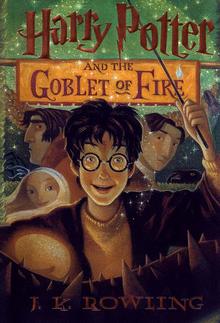 Harry Potter and the Goblet of Fire
Harry Potter and the Goblet of Fire Harry Potter and the Deathly Hallows
Harry Potter and the Deathly Hallows Harry Potter and the Order of the Phoenix
Harry Potter and the Order of the Phoenix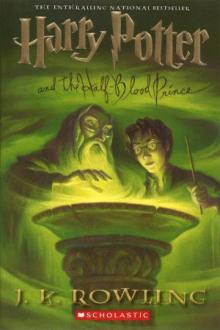 Harry Potter and the Half-Blood Prince
Harry Potter and the Half-Blood Prince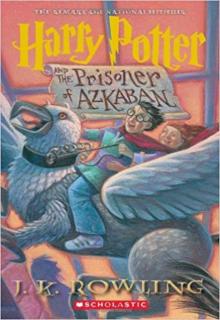 Harry Potter and the Prisoner of Azkaban
Harry Potter and the Prisoner of Azkaban Fantastic Beasts and Where to Find Them
Fantastic Beasts and Where to Find Them Short Stories from Hogwarts of Heroism, Hardship and Dangerous Hobbies
Short Stories from Hogwarts of Heroism, Hardship and Dangerous Hobbies Hogwarts: An Incomplete and Unreliable Guide
Hogwarts: An Incomplete and Unreliable Guide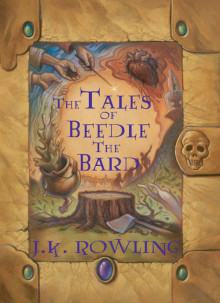 The Tales of Beedle the Bard
The Tales of Beedle the Bard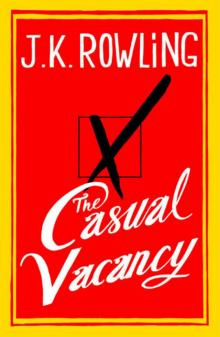 The Casual Vacancy
The Casual Vacancy Harry Potter and the Cursed Child
Harry Potter and the Cursed Child Short Stories from Hogwarts of Power, Politics and Pesky Poltergeists
Short Stories from Hogwarts of Power, Politics and Pesky Poltergeists Quidditch Through the Ages
Quidditch Through the Ages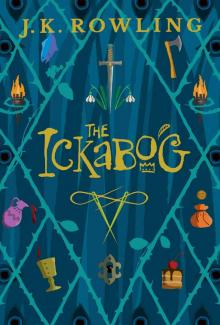 The Ickabog
The Ickabog![Fantastic Beasts, The Crimes of Grindelwald [UK] Read online](http://i1.bookreadfree.com/i/03/19/fantastic_beasts_the_crimes_of_grindelwald_uk_preview.jpg) Fantastic Beasts, The Crimes of Grindelwald [UK]
Fantastic Beasts, The Crimes of Grindelwald [UK] Harry Potter and the Cursed Child: Parts One and Two
Harry Potter and the Cursed Child: Parts One and Two The Prisoner of Azkaban
The Prisoner of Azkaban Fantastic Beasts: The Crimes of Grindelwald
Fantastic Beasts: The Crimes of Grindelwald The Hogwarts Library Collection
The Hogwarts Library Collection Short Stories from Hogwarts of Heroism, Hardship and Dangerous Hobbies (Kindle Single) (Pottermore Presents)
Short Stories from Hogwarts of Heroism, Hardship and Dangerous Hobbies (Kindle Single) (Pottermore Presents) Harry Potter and the Deathly Hallows hp-7
Harry Potter and the Deathly Hallows hp-7 Hogwarts: An Incomplete and Unreliable Guide (Kindle Single) (Pottermore Presents)
Hogwarts: An Incomplete and Unreliable Guide (Kindle Single) (Pottermore Presents) Harry Potter and the Goblet of Fire hp-4
Harry Potter and the Goblet of Fire hp-4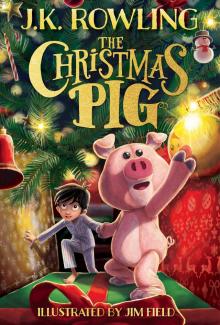 The Christmas Pig
The Christmas Pig Harry Potter and the Sorcerer's Stone
Harry Potter and the Sorcerer's Stone The Order of the Phoenix
The Order of the Phoenix Harry Potter and the Prisoner of Azkaban hp-3
Harry Potter and the Prisoner of Azkaban hp-3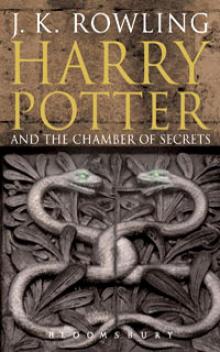 Harry Potter and the Chamber of Secrets hp-2
Harry Potter and the Chamber of Secrets hp-2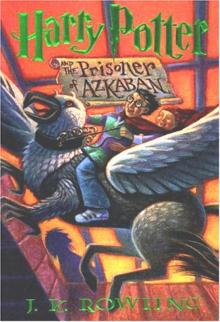 HP 3 - Harry Potter and the Prisoner of Azkaban
HP 3 - Harry Potter and the Prisoner of Azkaban The Half-Blood Prince
The Half-Blood Prince The Hogwarts Collection
The Hogwarts Collection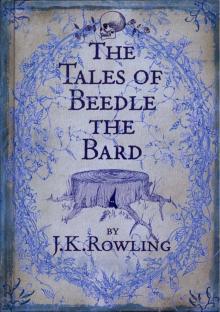 Tales of Beedle the Bard
Tales of Beedle the Bard The Goblet of Fire
The Goblet of Fire Harry Potter and the Half-Blood Prince hp-6
Harry Potter and the Half-Blood Prince hp-6 Short Stories from Hogwarts of Power, Politics and Pesky Poltergeists (Kindle Single) (Pottermore Presents)
Short Stories from Hogwarts of Power, Politics and Pesky Poltergeists (Kindle Single) (Pottermore Presents) Harry Potter and the Sorcerer's Stone hp-1
Harry Potter and the Sorcerer's Stone hp-1